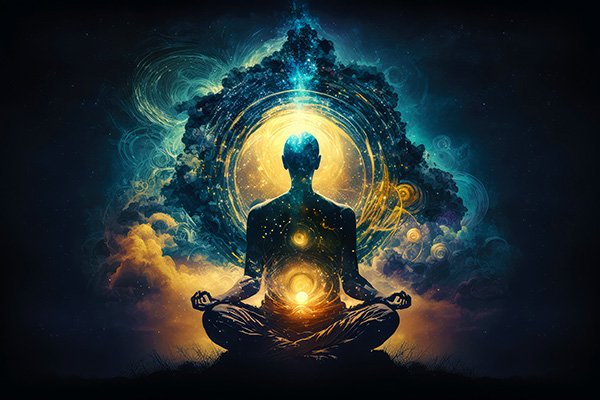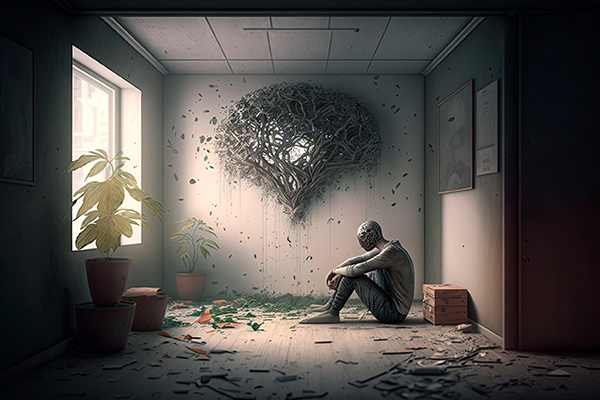self-doubt
Letting Go Of What No Longer Serves You
 Letting go is never simple or easy, but it’s often necessary for our health, happiness, and spiritual growth. It’s a powerful act that frees our soul and honors our true essence.
Letting go is never simple or easy, but it’s often necessary for our health, happiness, and spiritual growth. It’s a powerful act that frees our soul and honors our true essence.
Letting go is about releasing what no longer serves us to create space for more joy, peace, abundance, and meaningful experiences to flow our way. It’s not about loss or sacrifice – it’s about making room for something better.
By letting go, we deepen our connection to our Higher Self, Spirit, and the Divine. We release the burdens that limit us, allowing us to step into our best life.
It’s a conscious choice to stay stuck or move forward. This means choosing to let go of negative thoughts, emotions, desires, habits, beliefs, or material things that hold us back. When we release these attachments, we open the door to new blessings, miracles, and personal growth.
Choosing to let go and taking the first steps can sometimes feel daunting. It’s normal to feel overwhelmed, but trust that each step you take to release the old and welcome the new brings you closer to peace, joy and lasting fulfillment.
As we release old patterns, we often feel lighter, more energized, and at peace. This newfound freedom allows us to explore new possibilities, pursue our passions, and live authentically. It’s not about forgetting – it’s about freeing ourselves from what holds us back and stepping into the full light of our true potential.
Shield Your Dreams From The Naysayers
 I’m in the midst of a major shift in my life – a bold leap forward that promises transformative and exciting changes for me and my family.
I’m in the midst of a major shift in my life – a bold leap forward that promises transformative and exciting changes for me and my family.
It is taking a lot of my time and requires a lot of work and personal sacrifice, as there are many moving parts that need to align to make it all happen. However, I know it will work and I trust in spirit’s guidance and divine timing. I’ve successfully navigated similar situations before in my life, so I’m confident it can be done.
As is often the case in these situations, I find myself surrounded by people who are projecting their fears and limitations onto me and my goals. Based on conversations with friends and clients who are supportive and encouraging, this seems to be a common pattern. What is clear to me is that these are people who have chosen to live very different lives from mine.
For example, I have a relative who has always lived in fear and has repeatedly tried to discourage me from every endeavor I’ve ever pursued — almost all of which have been successful. The few that have not worked out for the best I consider valuable life lessons.
I started my first business when I was 26 years old. This family member scoffed at me, saying it was too risky and that I was wasting my time and money. Well, that business ended up paying more than just my bills for over a decade, while many of my peers spent the best years of their lives in soul-destroying dead-end jobs. It allowed me, for example, to buy two houses and several new cars, and best of all, I loved what I was doing!
Everything Happens For A Reason
 Challenges, setbacks and disappointments are inevitable in life. Sometimes it can even feel like the entire universe is conspiring against us!
Challenges, setbacks and disappointments are inevitable in life. Sometimes it can even feel like the entire universe is conspiring against us!
But this perspective is an illusion born of our human experience. Spirit doesn’t desire our failure or suffering. Instead, it seeks to lead us to joy, abundance, and fulfillment.
Many of us, however, fall into the habit of blaming God, Spirit, the Universe, or others for the hardships we face. But to truly grow, we must change this mindset. Instead of dwelling on blame, it’s important to examine the lessons hidden in each challenge. By asking why these situations arose and what we can learn from them, we transform pain into wisdom and setbacks into stepping stones.
Consider the heartache of losing a long-term partner. You may have built a life together – marriage, children, shared dreams – only to wake up one day to abandonment. Questions arise: Why did this happen? What could I have done differently?
It’s important to realize that in most cases these events are not your fault. Free will governs each person’s choices. While her decision to leave may hurt you deeply, it is a reflection of her own path, not your worth. Self-doubt often creeps in, especially for women, as thoughts of inadequacy arise. But self-esteem cannot come from others-it must come from within.
Instead of focusing on what you could have done, consider this: their departure may have been necessary for your growth. Spirit often removes people from our lives to make room for greater blessings. In hindsight, you may realize that staying with that person would have hindered your potential or delayed the arrival of something better.
Embrace Who You Are And Shine Your Light!
 We all come to this planet with our own unique gifts. Just as no one on this planet has the same fingerprint as you, no one has your unique personality, talents and life purpose. Sure, some of us may look alike, but our soul essence and life purpose is completely unique from one person to the next.
We all come to this planet with our own unique gifts. Just as no one on this planet has the same fingerprint as you, no one has your unique personality, talents and life purpose. Sure, some of us may look alike, but our soul essence and life purpose is completely unique from one person to the next.
And in a world that often emphasizes conformity and sameness, it’s also important to remember this spiritual truth: Your uniqueness is not a quirk; it’s your superpower!
I often feel sad when I see young people on social media copying each other or trying to be just like everyone else. Of course, they want to fit in and be accepted, and they fear being rejected by their peers. Unfortunately, this struggle is not limited to the younger generation. It seems that many adults are also caught up in the senseless hamster wheel of imitation and keeping up with the Joneses.
I once asked a girl who was imitating her friend why she wanted to be a copy of someone else. I reminded her, “You are gifted and a very talented artist. At first she was taken aback, but after a few moments I felt a spark of understanding in her. Then she looked at me and said, “Oh my God, you’re so right!” She, like so many others, needed a reminder of her inherent worth and unique individuality.
Each of us comes to this planet to share our special light in our own unique way. If more children were told from a young age how special they are and had their gifts nurtured by their parents and teachers, perhaps we would live in a much safer, happier and more compassionate world. Instead, I see so many folks yearning to fit in rather than embracing their individual paths and personal gifts.
The Essential Spiritual Practice Of Self-Love
 The first person each of us is meant to love is ourselves. But somewhere along the way, many of us forget or overlook this essential form of love.
The first person each of us is meant to love is ourselves. But somewhere along the way, many of us forget or overlook this essential form of love.
In a world that tends to reward judgment and criticism while valuing perfectionism and material success, many of us become estranged from our own worth and divine essence by falling into these societal patterns of self-judgment and negativity.
To make matters worse, what most people caught in this web of self-criticism do not realize is that unconditional self-love is the very foundation of our soul journey in this lifetime. In fact, it is the essential spiritual practice for a more joyful, deeply meaningful existence and a cornerstone of our spiritual evolution.
We often find ourselves caught up in self-doubt, judgment, and the pursuit of external validation. These patterns hinder our connection to our true essence and limit our ability to radiate divine love and compassion. Embracing unconditional self-love frees us from these limitations and allows us to step into our authentic power.
This journey begins with self-awareness and compassion. By observing our thoughts and feelings without judgment, we can identify the limiting beliefs and negative self-talk that have shaped our perception of ourselves. With gentle understanding, we can release these self-imposed chains and replace them with affirmations of self-worth and acceptance. When we practice self-compassion, we create a safe space for ourselves to heal and grow, embracing our imperfections as part of our unique journey.
Always Choose Your Gut Over Your Heart And Mind
 We all have a higher purpose in this lifetime, and yet many never awaken to it, much less achieve it, because their ego has become more prominent in their lives than their higher self.
We all have a higher purpose in this lifetime, and yet many never awaken to it, much less achieve it, because their ego has become more prominent in their lives than their higher self.
How do you know if what you are doing is for your highest good? How do you make sure you are aligned with your soul purpose? How do you know if what you want out of life is based on your worldly desires instead of your spiritual mission in this lifetime?
Well, you listen to your inner guidance. You trust your intuition. You follow your gut.
When you were born, a deep-seated dream was placed within you. As children we are often more in touch with our true calling or purpose, but many of us lose that awareness as we grow older. Unfortunately, it has been buried by the expectations of society and the many distractions of the material world.
Often our parents, peers, teachers, and mentors play a significant role in this process of shutting down our spiritual awareness. Has anyone ever laughed at you when you told them what you wanted to do or be? Did someone say, “Go back and think about that because it will never happen”? Each of us has a different story as to why we do or don’t achieve our dreams in life.
Today is the day to decide, “I will achieve my dreams as long as they come from the spirit and are for my highest good.” It is time to look at your dreams for your life from a deeper perspective.
Unstuck Your Life By Transmuting Your Origin Story
 Do you feel that no matter what you do, your life experiences seem to be stuck on repeat? Are you living the same scenario over and over with a different cast of characters? Or maybe even the same cast, but going through the same problems over and over with no change? If any of this sounds familiar, you may need to revise your origin story.
Do you feel that no matter what you do, your life experiences seem to be stuck on repeat? Are you living the same scenario over and over with a different cast of characters? Or maybe even the same cast, but going through the same problems over and over with no change? If any of this sounds familiar, you may need to revise your origin story.
We all have an origin story. It is a set of deeply held ideas and beliefs that shapes how we see ourselves and our place in the world. It is the story of that we constantly repeat when we talk about ourselves or think about our life experiences. Internally, we use it to define ourselves, and externally, we use it to present ourselves to others.
Our story of origin comes from family, early life experiences, and the choices we made about ourselves as we grew up. While it helps define us, it can also become a prison, limiting our growth and repeating unsatisfying patterns in what we manifest.
In my work as a psychic consultant, I often find in readings that many people are held back by their origin story without even realizing it. When we hold on too tightly to our chosen narrative, we become trapped in cycles that prevent us from evolving into the version of ourselves we truly want and deserve to be.
An origin story differs from a limiting belief in that it is more about the construction of our identity and personality – who we are and how we want to be in the world. It can be more difficult to identify and deconstruct because it is such a strong part of our personal identity. However, it is similar to limiting beliefs in that it is important to explore and become aware of it because it can hold us back and create very unsatisfying life experiences.